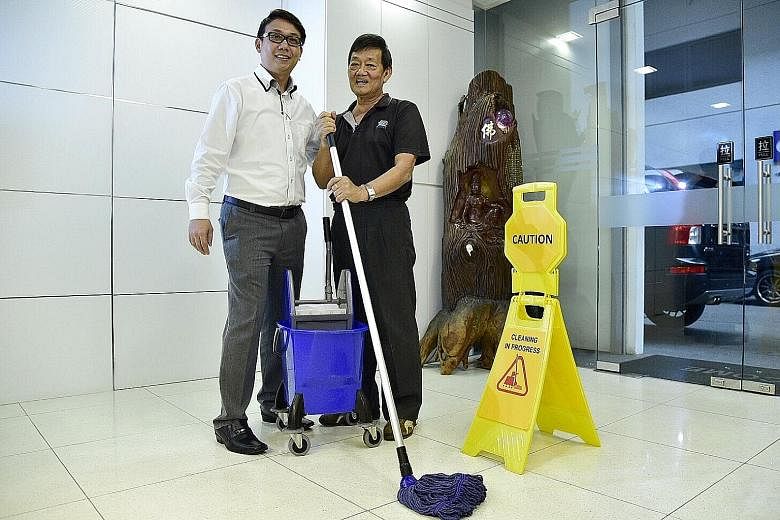After retiring as a principal technical officer with grid operator Singapore Power two years ago, Mr Dicky Ong is now getting a second wind in his career.
Shortly after retirement, the 68-year-old was itching to work and, through a contact, jumped into a new full-time role in the cleaning industry.
He joined Weishen Industrial Services as a team leader managing 13 people, and is based in a secondary school near his home in the east.
Mr Ong says: "Someone knew I was looking for another job, saying (the firm) needed a team leader. I was also a supervisor at Singapore Power, so I thought I fit the job.
"The industry is different, but the duties are similar as I have to manage people. Now, as team leader, my duty is to go around and see how the cleaners on each floor are doing.
"I check their health, that's part of safety too, and remind them of cleaning procedures."
Mr Ong is one of those who benefit from what the labour movement calls the progressive wage model - created to help push up wages - which Weishen Industrial Services has adopted.
The model includes wage ladders for industries such as cleaning and security. For instance, the model for the cleaning sector was developed by the Tripartite Cluster for Cleaners.
Mr Thomas Ang, 36, Weishen Industrial Services' head of operations, says the progressive wage model has helped to raise productivity.
"We are encouraged to send them for training, and the cleaners are now trained in areas such as general or outdoors, and the model gives them a corporate ladder for them to tap on.
"Training has been fine-tuned to suit the cleaning industry more, and also reduce unnecessary steps in cleaning. As they learn to use the correct tools and materials, productivity improves."
Mr Ang estimates overall productivity levels have increased 20 per cent. For cleaners younger than 60, it's about 30 per cent.
He notes: "It's good to provide them with a career path and attract people to join the industry. This is an ageing industry and we're looking for new blood to join us. After all, Singapore is known as a clean and green country, and we need to help maintain that."
Mr Ong, who has done so well that Weishen Industrial Services wanted to promote him to manage cleaners at a few schools, says having a clear career path encourages employees.
Even though he declined the promotion, he has already been training his second-in-command, who he says will be able to replace him when he eventually stops working.
Mr Ang, who has been in the sector for 15 years, says cleaners' salaries used to start from $600, and that did not change for more than 10 years.
-
PROGRESSIVE WAGE MODEL FOR THE CLEANING SECTOR
-
The progressive wage model for the cleaning sector was developed by the Tripartite Cluster for Cleaners.
It comprises three wage ladders for three broad categories - including office and commercial buildings - of cleaning jobs.
Cleaning companies must meet the model's requirements to get or renew their licences.
They also have to meet training requirements through the Singapore Workforce Skills Qualifications System for environmental cleaning, which helps workers in the cleaning industry improve their employability.
The requirements cover all Singaporeans and Singapore permanent residents in outsourced cleaning jobs.
Employers are also encouraged to incorporate the principles of progressive wages into the wage structure of their foreign cleaners.
But now, for those who clean offices or schools, for instance, a general cleaner's salary starts from $1,000 and can go up to at least $1,600 for a supervisor.
Mr Ang notes that without the progressive wage model, salaries would not improve.
It has created a "win-win situation for the employers, employees and building owners", he says, adding work is now more efficient, employees can spend more time on other areas that need it and they finish the job more quickly.
Even though salary costs may have risen about 5 to 8 per cent, Mr Ang says it allows the company to retain workers and is worth it in the long run for everyone.
He added: "Some of our current operations managers have moved up from their previous roles, and we want to bring in more of the younger generation to join us.
"I hope the Government will help push up cleaners' salaries. They are still considered one of the lowest-paid workers here, but their role is important and we want to raise not only their salaries, but also the status and image of the industry."

